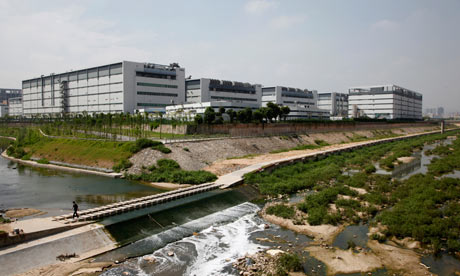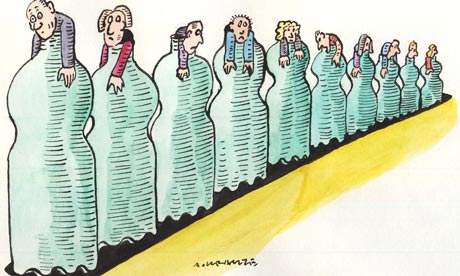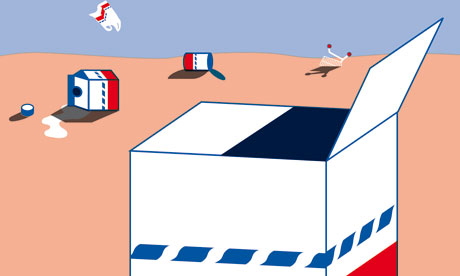Our largest companies have become so complex that no one's expected to fully know what's going on. Yet the rewards are bigger than ever

Hon Ha's Foxconn plant in Shenzhen, China, in 2010. That year there were 12 suicides in the 300,000-strong workforce. 'The top managers of Apple escaped blame because these deaths happened in factories in another country (China) owned by a company from yet another country (Hon Hai, the Taiwanese multinational).' Photograph: Qilai Shen
George Osborne confirmed on Monday that he would accept the recommendation of Britain's parliamentary commission on banking standards and add to his banking reform bill a new offence of "reckless misconduct in the management of a bank".
That is a bit of a setback for the managerial class, but it still does not sufficiently change the overall picture that it is a great time to be a top manager in the corporate world, especially in the US and Britain.
Not only do they give you a good salary and handsome bonus, but they are really understanding when you fail to live up to expectations. If they want to show you the door in the middle of your term, they will give you millions of dollars, even tens of millions, in "termination payment". Even if you have totally screwed up, the worst that can happen is that they take away your knighthood or make you give up, say, a third of your multimillion-pound pension pot.
Even better, the buck never stops at your desk. It usually stops at the lowest guy in the food chain – a rogue trader or some owner of a two-bit factory in Bangladesh. Occasionally you may have to blame your main supplier, but rarely your own company, and never yourself.
Welcome to the age of irresponsibility.
The largest companies today are so complex that top managers are not even expected to know fully what is really going on in them. These companies have also increasingly outsourced activities to multiple layers of subcontractors in supply chains crisscrossing the globe.
Increasing complexity not only lowers the quality of decisions, as it creates an information overload, but makes it more difficult to pin down responsibilities. A number of recent scandals have brought home this reality.
The multiple suicides of workers in Foxconn factories in China have revealed Victorian labour conditions down the supply chains for the most futuristic Apple products. But the top managers of Apple escaped blame because these deaths happened in factories in another country (China) owned by a company from yet another country (Hon Hai, the Taiwanese multinational).
No one at the top of the big supermarkets took serious responsibility in the horsemeat scandal because, it was accepted, they could not be expected to police supply chains running from Romania through the Netherlands, Cyprus and Luxembourg to France (and that is only one of several chains involved).
The problem is even more serious in the financial sector, which these days deals in assets that involve households (in the case of mortgages), companies and governments all over the world. On top of that these financial assets are combined, sliced and diced many times over, to produce highly complicated "derivative" products. The result is an exponential increase in complexity.
Andy Haldane, executive director of financial stability at the Bank of England, once pointed out that in order to fully understand a CDO2 – one of the more complicated financial derivatives (but not the most complicated) – a prospective investor needs to absorb more than a billion pages of information. I have come across bankers who confessed that they had derivative contracts running to a few hundred pages, which they naturally didn't have time to read.
Given this level of complexity, financial companies have come to rely heavily on countless others – stock analysts, financial journalists, credit-rating agencies, you name it – for information and, more importantly, making judgments. This means that when something goes wrong, they can always blame others: poor people in Florida who bought houses they cannot afford; "irresponsible" foreign governments; misleading foreign stock analysts; and, yes, incompetent credit-rating agencies.
The result is an economic system in which no one in "responsible" positions takes any serious responsibility. Unless radical action is taken, we will see many more financial crises and corporate scandals in the years to come.
The first thing we need is to modernise our sense of crime and punishment. Most of us still instinctively subscribe to the primeval notion of crime as a direct physical act – killing someone, stealing silver. But in the modern economy, with a complex division of labour, indirect non-physical acts can also seriously harm people. If misbehaving financiers and incompetent regulators cause an economic crisis, they can indirectly kill people by subjecting them to unemployment-related stress and by reducing public health expenditure, as shown by books like The Body Politic. We need to accept the seriousness of these "long-distance crimes" and strengthen punishments for them.
More importantly, we need to simplify our economic system so that responsibilities are easier to determine. This is not to say we have to go back to the days of small workshops owned by a single capitalist: increased complexity is inevitable if we are to increase productivity. However, much of the recent rise in complexity has been designed to make money for certain people, at the cost of social productivity. Such socially unproductive complexity needs to be reduced.
Financial derivatives are the most obvious examples. Given their potential to exponentially increase the complexity of the financial system – and thus the degree of irresponsibility within it – we should only allow such products when their creators can prove their productivity and safety, similar to how the drug approval process works.
The negative potential of outsourcing in non-financial industries may not be as great as that of financial derivatives, but the buying companies should be made far more accountable for making their subcontractors comply with rules regarding product safety, working conditions and environmental standards.
Without measures to simplify the system and recalibrate our sense of crime and punishment, the age of irresponsibility will destroy us all.




